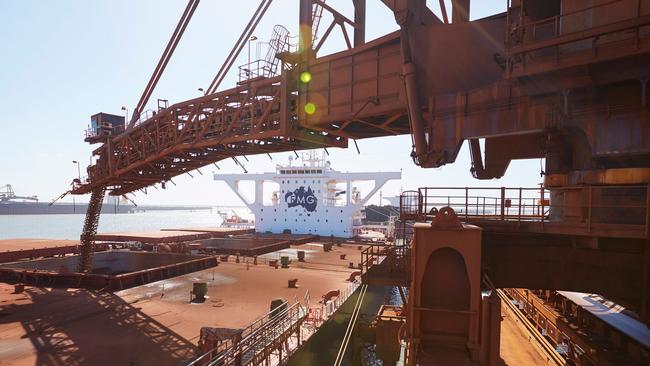Disasters push iron ore prices up
Iron ore futures in China had their best day in seven weeks yesterday, extending a record-breaking rally.

Iron ore futures in China had their best day in seven weeks yesterday, extending a record-breaking rally amid supply disruption concerns flagged by the world’s major sellers of the steelmaking raw material as well as demand from steel mills.
The most-traded May 2019 iron ore contract on the Dalian Commodity Exchange briefly touched “limit up” at 694.5 yuan ($US103) a tonne in late trade before ending at 690.5 yuan, a hefty 5.3 per cent rise from Tuesday’s record close.
“I think there’s still room for price to go up, maybe around $US5 to $US6 (a tonne) more from the current level,” a Shanghai-based trader said, before the Dalian price hit the day’s upper limit.
There was “good” iron ore demand from steel mills, he said.
The spot price of iron ore for delivery to China, with 62 per cent fines, stood at $US90 a tonne on Tuesday, according to SteelHome consultancy. Barclays said it expects an improvement in supply to drag iron ore prices lower to $US70 a tonne in 2020, from its revised forecast of $US75 for 2019, up from $US69 previously.
The world’s top suppliers of the steelmaking raw material — Vale, BHP, Rio Tinto and Fortescue — have reduced their output and shipment estimates this year, raising concerns the market could be tighter than expected.
Iron ore has climbed from about $US55 a tonne at the start of this financial year to more than $US80 today, helped by stronger than expected demand from the world’s biggest customer, China, supply discipline from the major producers and significant disruption to production from Brazil.
The price surge caught the government by surprise and helped add $6bn to expected corporate tax receipts between last year’s budget and 2019-20.
Iron ore prices initially rallied after the fatal tailings dam disaster at a mine operated by Vale in Brazil in February. Last week, the world’s biggest supplier said its sales this year could be up to 75 million tonnes less than initially forecast, after several mines were halted following the disaster. On Monday, Vale said it failed to obtain stability certificates for 13 dams under review and as a consequence, according to ANZ Research, Vale has suspended operations at 10 dams and dikes in Minas Gerais.
Weather-related supply disruptions from Australia added to the price pressure, with BHP on Tuesday saying initial estimates indicated its iron ore production would take a hit of about 6-8 million tonnes after Cyclone Veronica affected its operations. Rio, the world’s second-largest iron ore miner, on Monday cut its 2019 outlook for shipments from Australia’s Pilbara region due to production disruption and damage caused by Cyclone Veronica. Fortescue said on March 25 it expected 1.5-2 million tonnes of shipments to be delayed by the bad weather.
Steel production curtailments have been extended in China’s steelmaking cities to curb air pollution.
Reuters
